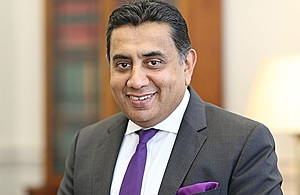An inclusive political solution in Libya is still greatly needed
Thank you very much, Mr President. Thank you to Stephanie, as acting Special Representative of the Secretary-General, for your briefing. And we hope that we’ll be able to agree on a permanent successor for you before too long. And now I thank, through you, your staff and all that are working so hard to try to end the conflict in Libya, in what are not always the most promising circumstances and context.
Let me start by sharing the deep concern that you expressed, Stephanie, at the significant escalation in hostilities in Libya. I think you describe an unprecedented increase in direct fire in civilian areas, which is extremely concerning. The cost in civilian lives and the damage to civilian infrastructure is totally unacceptable. And attacks in civilian areas, particularly on healthcare facilities, show a complete disregard for international law and must cease. At a time when countries around the world are coming together in the face of a shared threat from COVID-19, it is unconscionable that health care facilities are among the civilian infrastructure targeted. I also want to reiterate our continuing concern, the deteriorating human rights humanitarian situation in Libya. Again, Stephanie highlighted a million people now in need of humanitarian assistance. And the Secretary-General in his report made clear the situation – including the death, injury and displacement of significant numbers of civilians – is not acceptable, that civilians, including migrants and refugees, remain at risk. The intentional cutting of electricity, fuel, water or food supplies is a potential violation of international humanitarian law.
We remain particularly concerned by further reports that external parties continue to provide material, equipment, mercenaries. All member states must abide by their international obligations, including UN Security Council resolutions. And we note in this regard further reports of activity by the Wagner Group in Libya. Wagner Group activities continue to exacerbate the conflict and prolong the suffering of the Libyan people. And I want to urge all Security Council members to abide by the resolutions of this Council, which they themselves have voted for.
We condemn the blockade of oil facilities, only harming the Libyan people, and today has led to a loss of over $4 billion. Efforts to illicitly import aviation fuel into Libya are also unacceptable, and all parties must uphold the integrity and unity of the National Oil Corporation.
But there will not be a military victory, not least because the foreign actors involved in this war won’t permit. So an inclusive political solution, as set out in the Berlin Conference, offers the best hope for the stability and future prosperity that the Libyan people need and deserve. And we call on the LNA to engage substantively with the UN drafted ceasefire document of 23rd February, as the GNA have recently done. The United Kingdom reaffirms its support for Libya’s internationally recognised and legitimate institutions as agreed in the 2015 Libyan Political Agreement and as recognised by this Council.
Mr President, the United Kingdom is consistent in its belief that if the warring parties and their backers have the interests of the Libyan people at heart, they would cease fighting, cease the attacks on civilians, cease private or unilateral initiatives, and instead get behind the United Nations and the inclusive political solution. It is the only hope and it is what the Libyan people need and deserve after these years of conflict.
Let me just ask a question, if I may, Stephanie. I wondered if you could say whether there has been any change in the public mood and in public support for, or public attitudes towards the conflict since the COVID-19 outbreak, and whether there are any signs, the calculations of any of the parties to the conflict are being affected by that public view.
Thank you very much.
